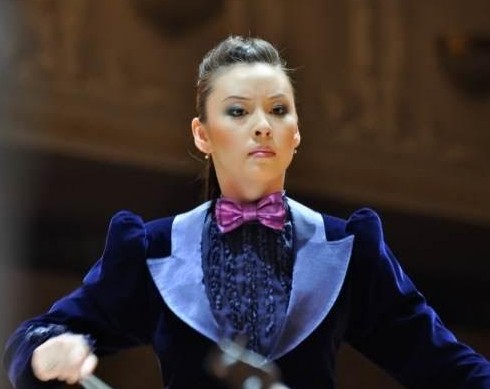Dinzukhra Tlendiyeva, artistic director and principal conductor of the Otyrar Sazy Orchestra, gives performances on the country’s main stages dedicated to the 90th anniversary of her father, Nurgisa Tlendiyev, a prominent Kazakh composer, People’s Artist of the USSR, state prize laureate and Khalyk Kaharmany (People’s Hero) title holder.
There is a Kazakh proverb which notes it is impossible to understand the soul of the people without understanding their music and Tlendiyeva has the privilege of presenting the unique charm of traditional melodies and original instruments to the public.
Tlendiyeva shared precious childhood memories associated with her father, as well as the positive impact of music on a child’s upbringing, in a recent interview with The Astana Times.
The young conductor is the only daughter of Tlendiyev, the gifted, professional conductor, and his wife, Dariga, a well-known actress and honoured artist of Kazakhstan. Her father took her to piano lessons at the Baisseitova Music School and by age ten she had already performed Mozart’s Piano Concert No. 8 with the orchestra. Tlendiyeva was 13 when he died.
“Although I was a little girl, I remember everything so clearly. He created his last seven works in 1998. He worked hard for a few months and we did not have to make noise at home. My father composed these pieces as if he was writing letters to his close friend. All he needed was music paper and a pencil. Then he was taken to the hospital in critical condition, but he still went to the rehearsal. I remember his joy when he completed all this orchestration. All the musical parts were given to the musicians and, finally the orchestra performed these compositions. He was happy as a child. I remember the happiness in his eyes after the performance,” she said.
Tlendiyev had a deep loyalty and affection for orchestra performers, calling them “geniuses.”
“The players missed him, as he was absent for several months. They performed his last works with love and respect. My father was so excited. He always shared his impressions with me despite my age,” she added.
Tlendiyeva graduated from Kurmangazy Kazakh National Conservatory as a national orchestra conductor in 2008. At 24, she became the new principal conductor of the well-respected orchestra and received praise for the stunning performance. It typically takes a long time to become a chief conductor, but talent, hard work and luck turned out to be the perfect combination.
“When we talk about the conductor, we usually imagine him being a bearded man of about 40 or 50. I am blessed and grateful that it happened to me at such an early age. My father’s biggest dream was to teach me to play the dombra, as he was an excellent virtuoso. Lately, I wrote a piece of music dedicated to him entitled ‘Arman’ (Dream). I think he would be incredibly happy that I followed in his footsteps as an orchestra conductor. Writing music requires an inspiration. I have pieces that I composed some time ago. My father created more than 500 compositions and it is an immense contribution to the Kazakh culture,” she said.
When it comes to playing, Tlendiyeva’s eyes sparkle with delight.
“Each conductor has its own vision of composition, so that each conductor works it out differently. It is the so-called conductors’ interpretation. A brilliant maestro inspires musicians and conveys the vision of the composer. My ultimate goal as a director is to attract more and more people to Kazakh folk music. It is necessary to popularise Kazakh folk music and the works of the Otyrar Sazy orchestra. Basically, the audience is keen on pop music. The situation is rather good with people’s interest in classical genres. As for the folk music, it is high-quality music, the music that has had a beneficial effect on mental development. Folk music tells us the history of our nation, teaches us to respect our homeland and keep our traditions and culture,” she said.
Tlendiyeva noted the social activities in which her troupe is involved.
“Once a year, the Almaty city Akimat organises the Parade of Orchestras for the purpose of popularising classical and traditional music. Our ensemble was pleased to participate in this event with a programme titled ‘The Legends of the Great Steppe.’ Traditional songs glorifying the great exploits of the brave batyrs (warriors) and love of country were performed in the open air, transferring the folk music lovers from the present time to the origins of the Kazakh people,” she said.
The conductor said music is the greatest passion of her life.
“Performing on the stage is an exciting process that gives extraordinary energy. But to me, my first viewer is my daughter. She attends all my concerts and sits in the front row. In my opinion, music has beneficial effects on a child’s upbringing. Musicians should bring music that not only entertains, but educates and inspires as well,” noted Tlendiyeva.
Founded in 1982, the Otyrar Sazy folklore and ethnographic orchestra is distinguished by its unique collection of ancient and modern Kazakh musical instruments. The assortment includes dombra, kobyz, mes-kobyz, saz-syrnai, shan-kobyz, sherter, sybyzgy, syrnai and zhetygen and percussion instruments such as asatayak, dauylpaz, kairak, konyrau and tuyak-tas.
Nurgisa Tlendiyev, the first artistic director and chief conductor, proved ancient folk instruments can perform not only simple pieces of music but epic dramatic compositions. The ensemble has toured in Germany, Iraq, Jordan, Morocco, North Korea, Saudi Arabia, Spain, Turkey and Vietnam.

